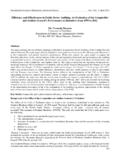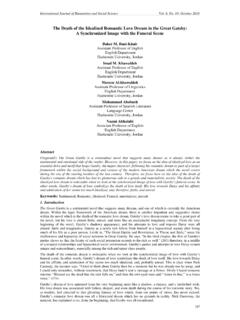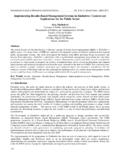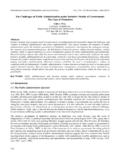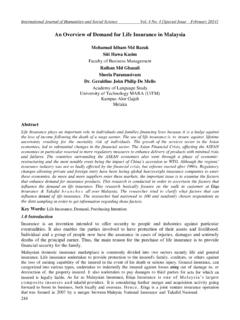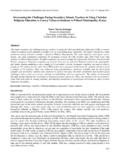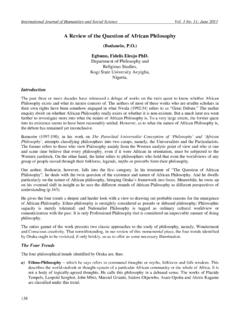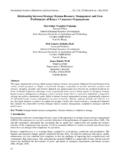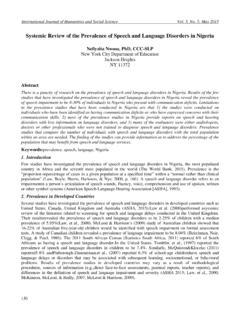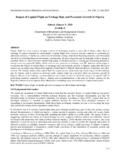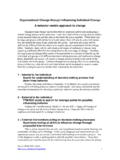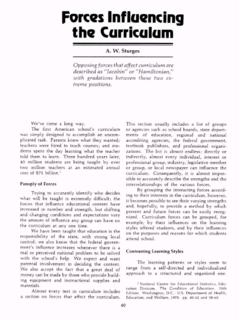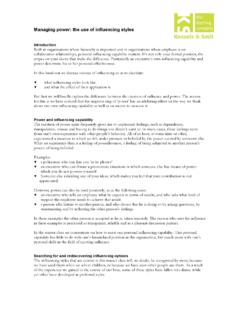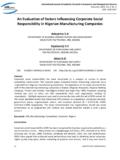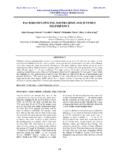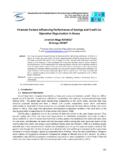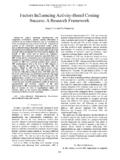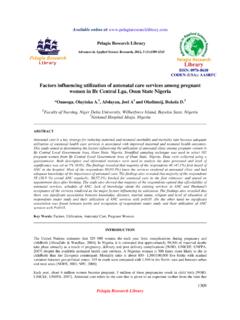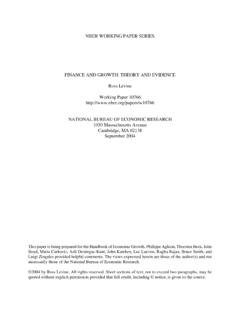Transcription of A Survey of the Factors Influencing Investment …
1 International Journal of Humanities and Social Science Vol. 4 No. 4 [Special Issue February 2014] 92 A Survey of the Factors Influencing Investment Decisions: The Case of Individual Investors at the NSE Ambrose Jagongo PhD Lecturer Vincent S. Mutswenje PhD student School of Business Kenyatta University Abstract Individual investments behaviour is concerned with choices about purchases of small amounts of securities for his or her own account. Investment decisions are often supported by decision tools. It is assumed that information structure and the Factors in the market systematically influence individuals Investment decisions as well as market outcomes.
2 The objective of the study was to establish the Factors Influencing Investment decisions at the Nairobi Stock Exchange. The study was conducted on the 42 investors out of 50 investors that constituted the sample size. To collect data the researcher used a structured questionnaire that was personally administered to the respondents. The questionnaire constituted 28 items. The respondents were the individual investors. In this study, data was analyzed using frequencies, mean scores, standard deviations, percentages, Friedman s test and Factor analysis techniques.
3 The researcher confirmed that there seems to be a certain degree of correlation between the Factors that behavioral finance theory and previous empirical evidence identify as the for the average equity investor. The researcher found out that the most important Factors that influence individual Investment decisions were: reputation of the firm, firm s status in industry, expected corporate earnings, profit and condition of statement, past performance firms stock, price per share, feeling on the economy and expected divided by investors. The findings from this research would provide an understanding of the various decisions to be made by investors based on the prevailing Factors and the eventual outcomes for each decision and would identify the most Influencing Factors on the company s investors behavior on how their future policies and strategies will be affected since Investment decisions by the investors will determine the company s strategy to be applied.
4 Key Words: Behavioural Finance, Investor Behaviour, Factors Influencing Investment decision Background to the Study Investment decisions are made by investors and Investment managers. Investors commonly perform Investment analysis by making use of fundamental analysis, technical analysis and judgment. Investment decisions are often supported by decision tools. It is assumed that information structure and the Factors in the market systematically influence individuals Investment decisions as well as market outcomes. Investor market behaviour derives from psychological principles of decision making to explain why people buy or sell stocks.
5 These Factors will focus upon how investors interpret and act on information to make Investment decisions. Behavioural finance is defined by Shefrin, (2000) as a rapidly growing area that deals with the influence of psychology on the behavior of financial practitioners . Individual investments behaviour is concerned with choices about purchases of small amounts of securities for his or her own account (Nofsinger and Richard, 2002). No matter how much an investor is well informed, has done research, studied deeply about the stock before investing, he also behaves irrationally with the fear of loss in the future.
6 This different behaviour in the individual investors is caused by various Factors which compromise the investor rationality. An individual investor is one who purchases generally small amounts of securities for his or her own account. In conventional financial theory, investors are assumed to be rational wealth-maximisers, following basic financial rules and basing their Investment strategies purely on the risk-return consideration. However, in practice, the level of risk investors are willing to undertake is not the same, and depends mainly on their personal attitudes to risk.
7 The Special Issue on Contemporary Issues in Social Science Center for Promoting Ideas, USA 93 Research in behavioural finance has developed rapidly in recent years and provides evidence that investors' financial decisions are also affected by internal and external behavioural Factors (Shefrin, 2000; Shleifer, 2000; Warneryd, 2001). It is generally believed that Investment decisions are a function of several Factors such as market characteristics and individual risk profiles, in addition to accounting information.
8 The disposition error shows that regardless of accounting information, investors are influenced by sunk cost considerations and asymmetrical risk preferences for gain/loss situations. The research findings by Nagy and Obenberger, (1994) which examined Factors Influencing investor behavior, suggested that classical wealth maximization criteria are important to investors, even though investors employ diverse criteria when choosing stocks. Contemporary concerns such as local or international operations, environmental track record and the firm s ethical posture appear to be given only cursory consideration.
9 The recommendations of brokerage houses, individual stock brokers, family members and co-workers go largely unheeded. Many individual investors discount the benefits of valuation models when evaluating stocks. Hussein A. H, (2007) found that expected corporate earnings, get rich quickly, stock marketability, past performance of the firm s stock, government holdings, and the creation of the organized financial markets are the investors considerations. Dimitrios I. M, (2007) conducted a study on Investors behavior in the (ASE) and found that individual investors rely more on newspapers/media and noise in the market when making their Investment decisions, while professional investors rely more on fundamental and technical analysis and less on portfolio analysis.
10 Market participants are exposed to a constant flow of information, ranging from quantitative financial data to financial news in the media, and socially exchanged opinions and recommendations. Processing all this information is a difficult task. Variables that are loaded heavily on this factor include coverage in the financial and general press, recent stock index returns, information obtained from internet, current economic indicators and recommendations by Investment advisory services (Francis and Soffer, 1997). Each of these variables represents an outside source of information that is perceived to be unbiased.
